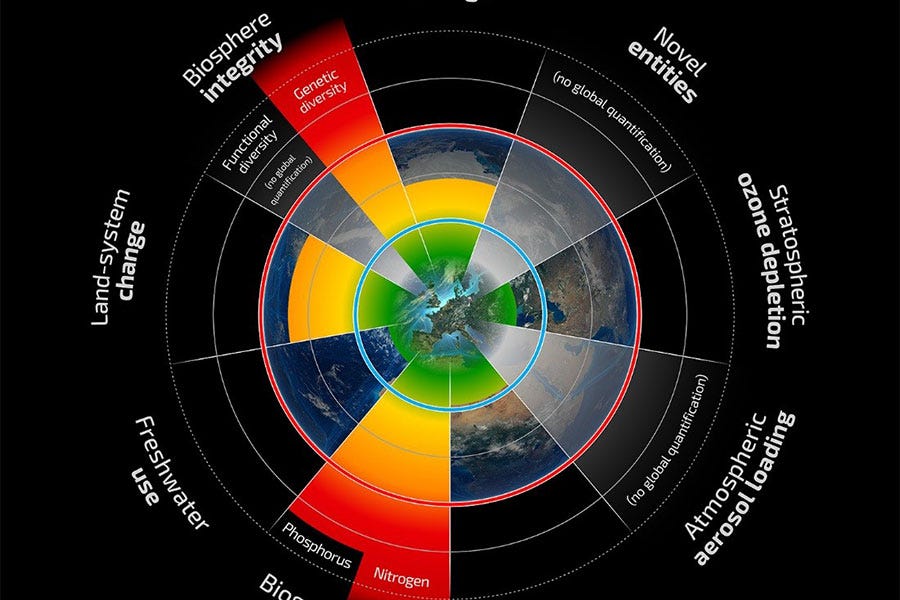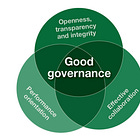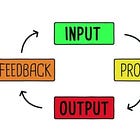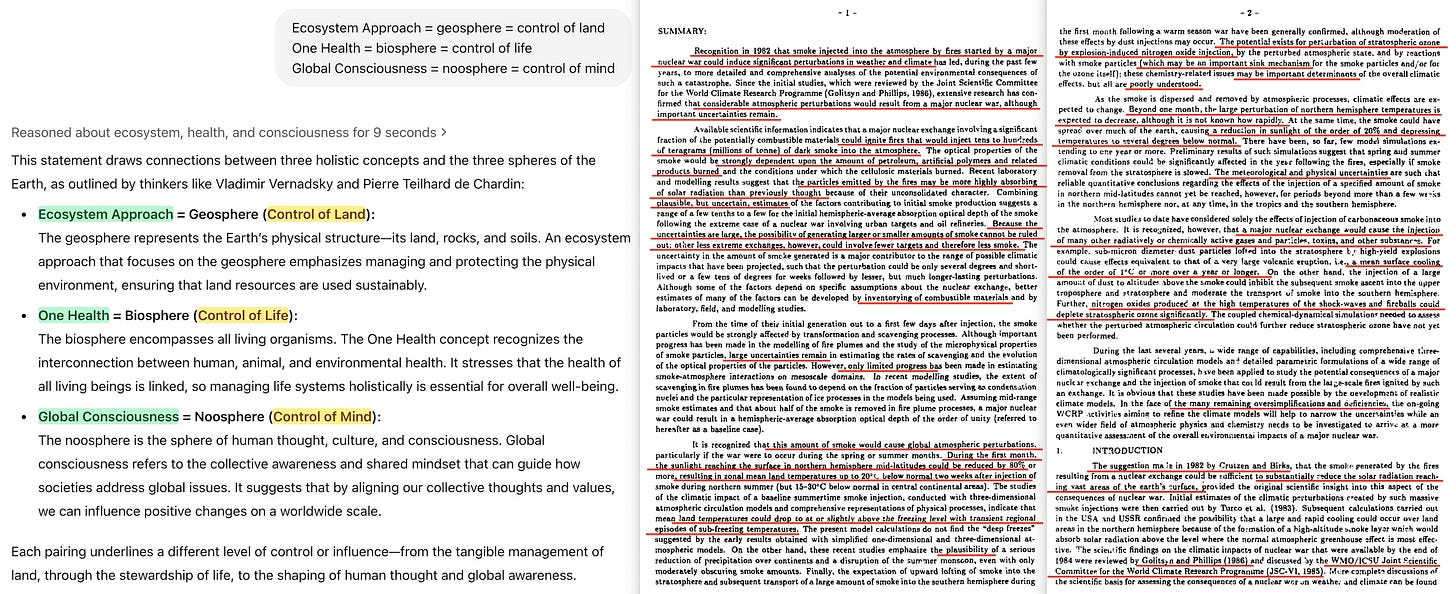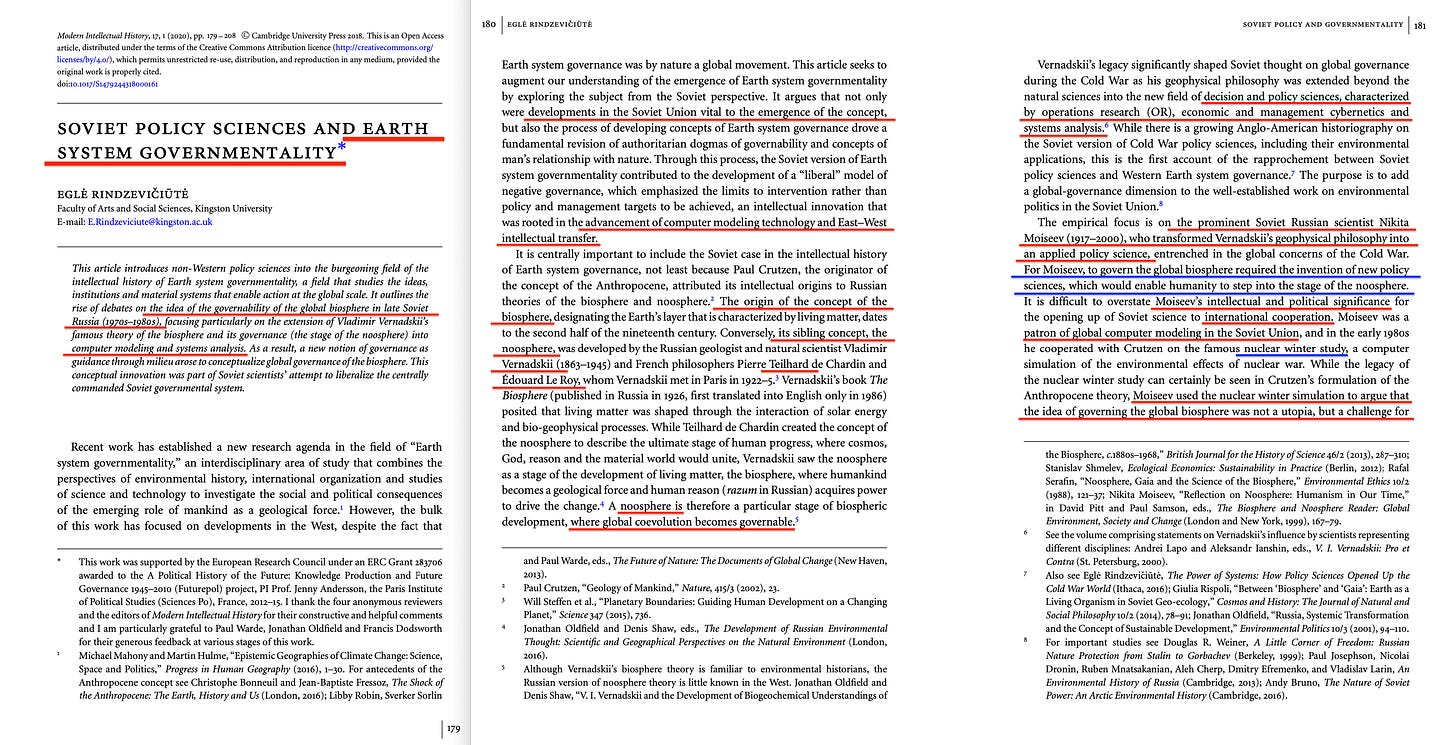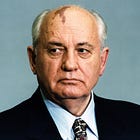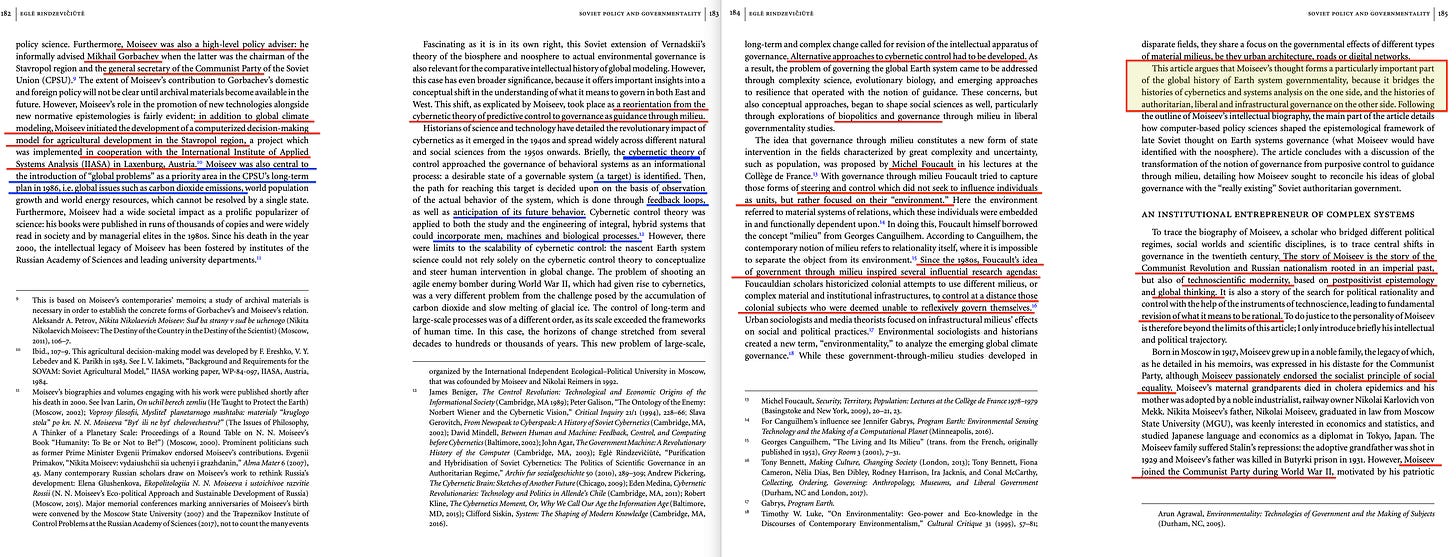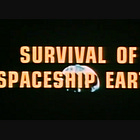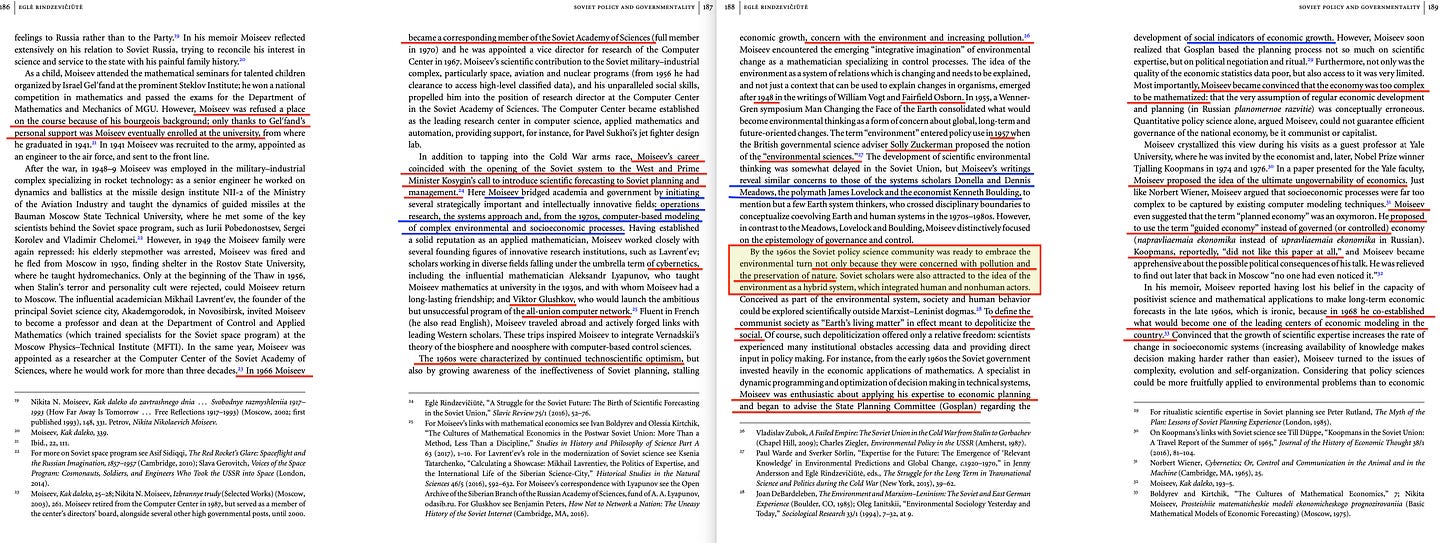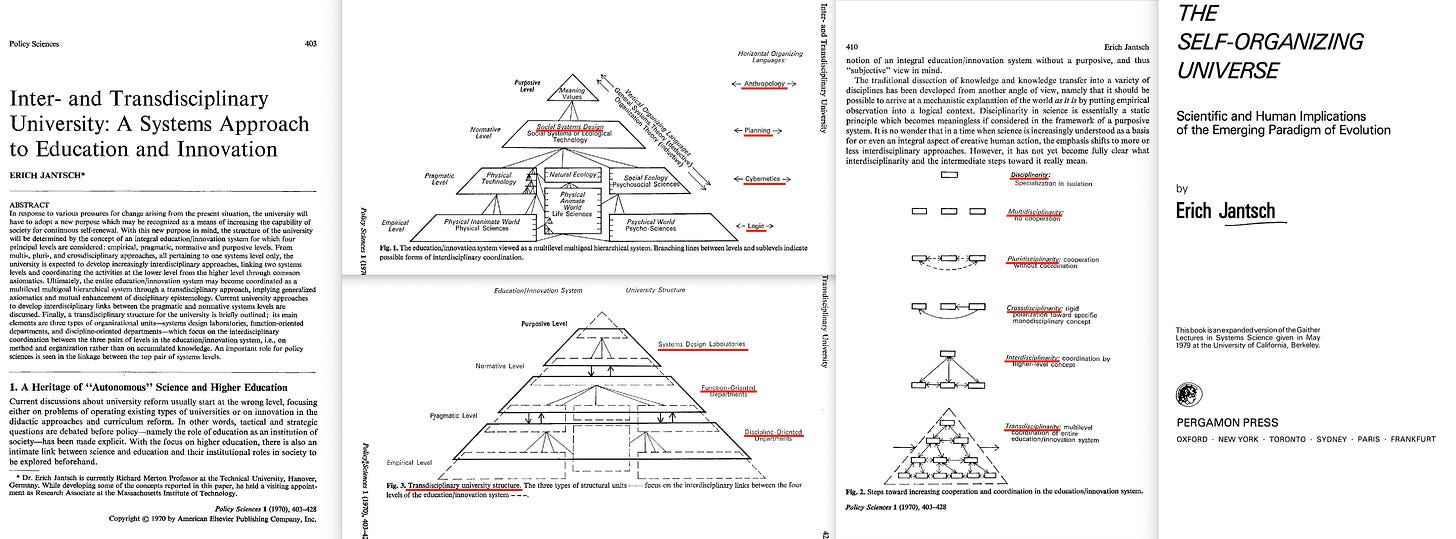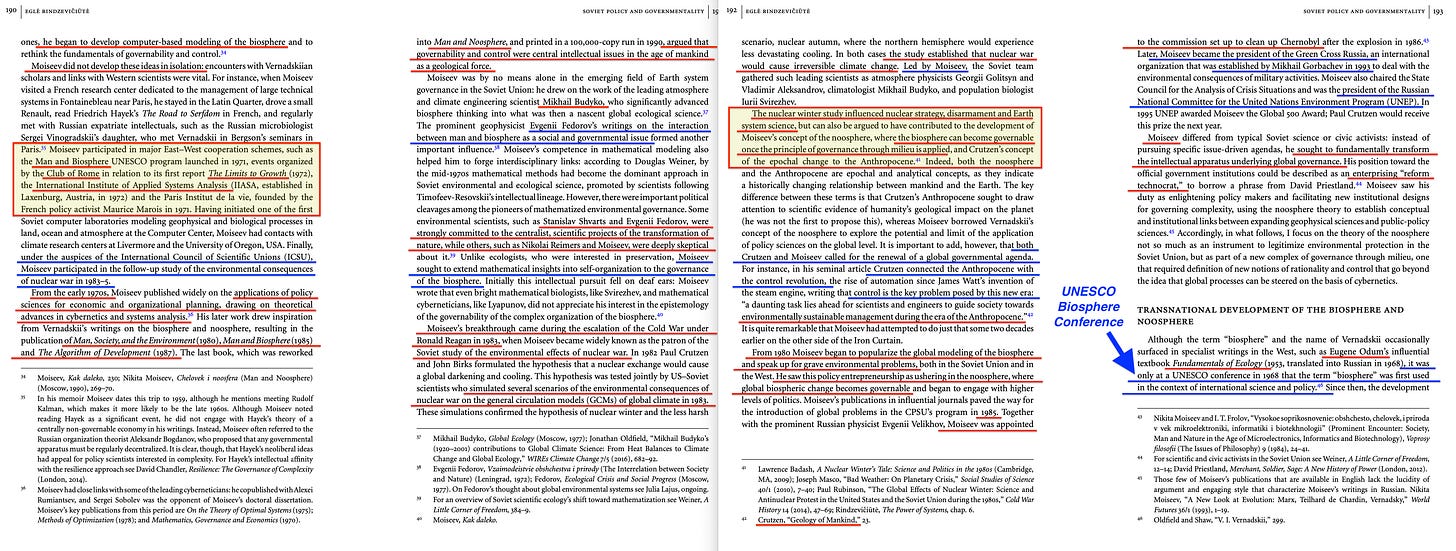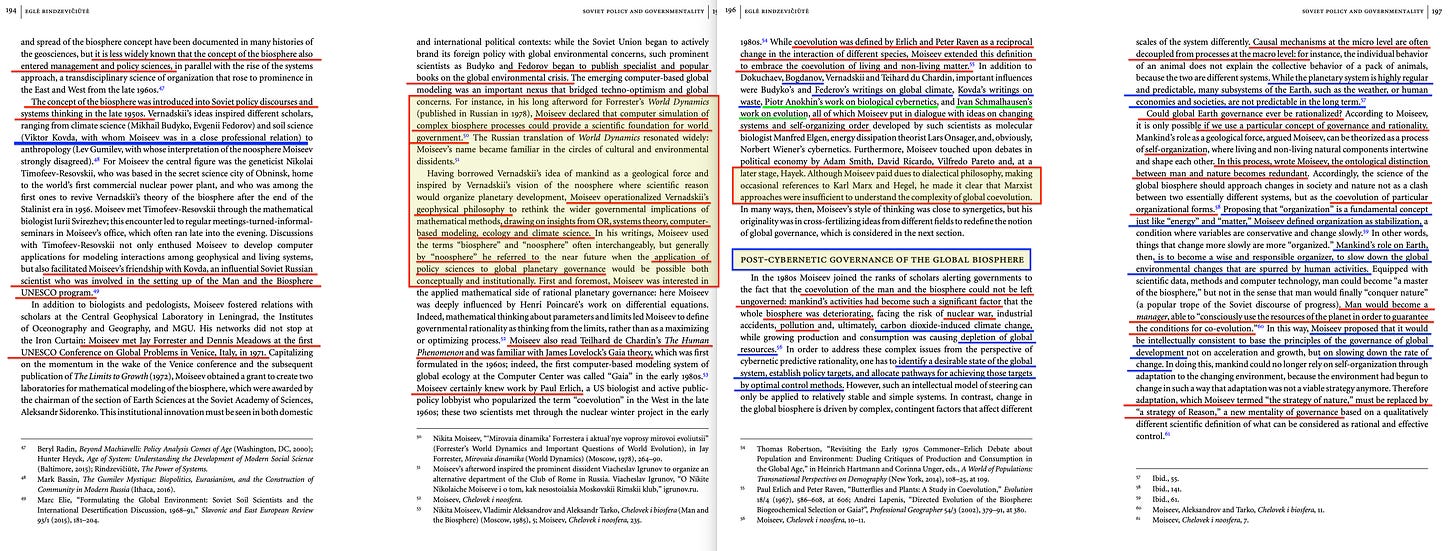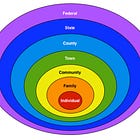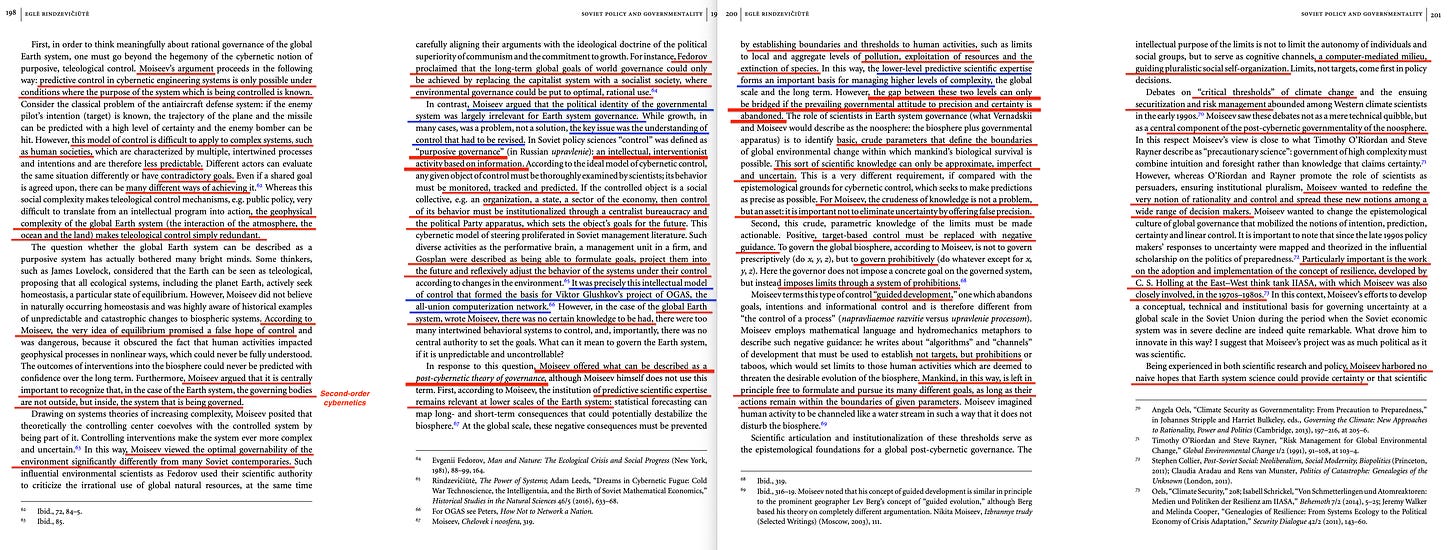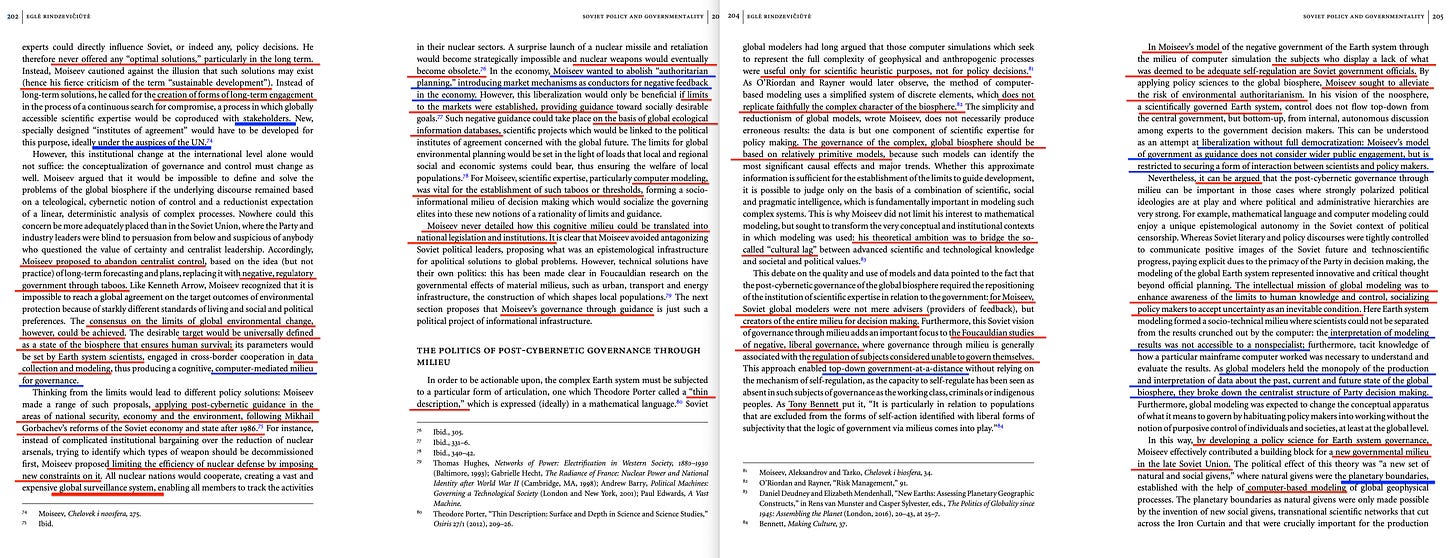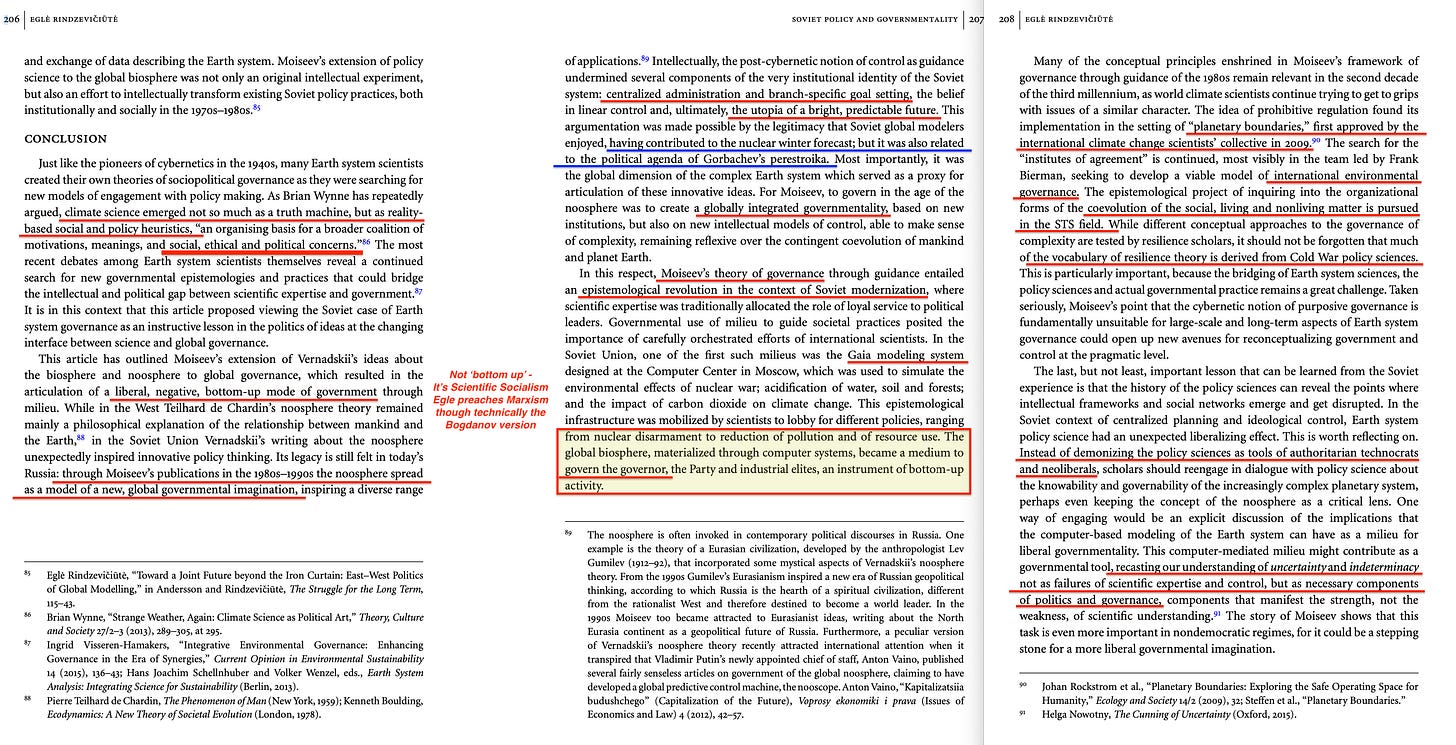Planetary Boundaries
I was blocked by Eglė Rindzevičiūtė on Twitter in May 2024 after I complimented her work on her book, The Power of Systems1, which covers the origins of the IIASA—the world’s premier computational modelling agency—as a tool of the technocratic elite.
At the time, I did wonder how anyone could remain as objective as her in reporting. But then, I hadn’t yet grasped the nuanced differences between what Marx was proposing and how Alexander Bogdanov’s solution diverged.
Ultimately, both are associated with top-down authoritarianism. However, while Karl Marx advocated for a rapid, revolutionary overthrow grounded in dialectical materialism, Bogdanov proposed a gradual, subversive process. Bogdanov’s approach replaces the need for violent revolution with the slow development of adaptive management through Tektology, while his empiriomonism transforms a supposedly objective scientific consensus—such as that on climate change—into ‘collectively-subjective’ legislative norms, with his Proletkult finally employed to indoctrinate the masses through education, culture, literature, and the arts.
But what does that actually mean?
It’s fairly simple. The—supposedly objective—best available scientific consensus on issues like climate change, when interpreted through the lens of empiriomonism, becomes the basis for rules to live by and is encoded into legislation. And while this interpretation might centre on differences in wealth as Marx suggested, it could just as easily shift to focus on virtually any issue favoured by our great benefactors who perform the interpretation—and never mind the validity of the alleged consensus.
Bogdanov’s empiriomonism thus serves as a subversive mechanism that ultimately challenges Marxist ideology. Incidentally, this is precisely what Lenin recognised, launching his scathing criticism of Bogdanov’s work—a critique that eventually led to Bogdanov’s expulsion from the Bolshevik Party he co‑founded with Lenin in 1903.
What Bogdanov suggested, in essence, was to embrace and extend Marxism, turning it into an tool of arbitrary rule, justified through alleged science. And that is the essence of difference between what Marx proposed, and Bogdanov’s solution of Scientific Socialism.
This post isn’t specifically about the IIASA2. Sure, they’re involved—after all, they’re the world’s premier computational modeling agency, working with controversial groups like the IPCC, whose ‘settled science’ you must ‘trust’ without question. Otherwise, you’ll be labelled a ‘science denier’ faster than Ursula von der Leyen can3 destroy4 incriminating5 text6 messages7 off8 her9 phone10, though this in a ‘transparent’ and ‘accountable’ manner, of course. Good Government Governance.
It’s not about The Power of Systems either, or even its 2023 sequel, Will of Power to Predict11. I could cover both, but let’s just say technocracy appears 60 times in the former. Instead, let’s focus on her 2018 paper, Soviet Policy Sciences and Earth System Governmentality12., which is ultimately about:
the idea of the governability of the global biosphere in late Soviet Russia (1970-1980s),
Through the use of:
computer modeling and systems analysis.
… cue the IIASA. And this approach ultimately stems from:
the new field of decision and policy sciences, characterized by operations research (OR), economic and management cybernetics and systems analysis.'
Operations Research, later termed Input-Output Analysis, examines system flow through self-monitoring (surveillance) and is modeled via General Systems Theory. Combine this with a Digital Twin, and you get forward predictions enabling Cybernetic control—including internal regulation through Resilience Theory.
And that is, essentially, how Adaptive Management operates.
The empirical focus is on the prominent Soviet Russian scientist Nikita Moiseev (1917-2000), who transformed Vernadski's geophysical philosophy into an applied policy science,
You’ll often find Vernadsky mentioned alongside Teilhard de Chardin. But while Teilhard focused on the noosphere’s spiritual aspects (and systems theory), Vernadsky dealt with the material. Moiseev, however, he’s the star of this story.
For Moiseev, to govern the global biosphere required the invention of new policy sciences, which would enable humanity to step into the stage of the noosphere
The noosphere, in short, represents Collective Consciousness—just as the biosphere aligns with One Health and the geosphere with the Ecosystem Approach.
If you merge the geosphere (natural sciences) and biosphere (social sciences), you get Bogdanov’s Tektology, while the noosphere (humanities) is managed through Proletkult—i.e., Planetary Management of Planetary Health through Bogdanov’s Empiriomonism.
See—most of this is actually quite straightforward. They just don’t want you to know, because, quite simply, you’re not worthy.
Moiseev used the nuclear winter simulation to argue that the idea of governing the global biosphere was not a utopia, but a challenge for policy science.
The early 80s nuclear winter study13 was yet another absurdly exaggerated model, built on worst-case assumptions scaled up by an order of magnitude—because why not. It followed the 1979 Convention on Long-Range Transboundary Air Pollution14, conveniently preceding the 1982 World Charter for Nature15, which framed the issue as a matter of national responsibility.
And Moiseev worked on that study.
As for Moiseev:
Moiseev was also a high-level policy adviser: he informally advised Mikhal Gorbachev when the latter was the chairman of the Stavropol region and the general secretary of the Communist Party
… and that’s a bit of an issue, because in speeches from the late ’80s, Gorbachev outlined a strategy to defuse Western fears of the Soviet threat—by redirecting attention to environmentalism.
The extent of Moiseev’s contribution to Gorbachev’s domestic and foreign policy will not be clear until archival materials become available in the future.
How extremely unfortunate, no?
However, Moiseev’s role in the promotion of new technologies alongside new normative epistemologies is fairly evident: in addition to global climate modeling, Moiseev initiated the development of a computerized decision-making model for agricultural development in the Stavropol region, a project which was implemented in cooperation with the International Institute of Applied Systems Analysis (IIASA) in Laxenburg, Austria
Decision-making outsourced to computers. Further, we have Moiseev, we have the IIASA, we have vastly imprecise global climate modelling.
Moiseev was also central to the introduction of ‘global problems’ as a priority area in the CPSU’s long-term plan in 1986, i.e. global issues such as carbon dioxide emissions, world population growth and world energy resources, which cannot be resolved by a single state
As for the legitimacy of these so-called ‘global problems’… well, that’s the question. Yet, it’s certainly convenient to centralise discussions on what they entail—if only to sideline the tedious peasants from our ‘strengthened democracy.’ But there are simply too many coincidences here for comfort
This shift, as explicated by Moiseev, took place as a reorientation from the cybernetic theory of predictive control to governance as guidance through milieu… Briefly, the cybernetic theory of control approached the governance of behavioral systems as an informational process: a desirable state of a governable system (a target) is identified. Then, the path for reaching this target is decided upon on the basis of observation of the actual behavior of the system, which is done through feedback loops, as well as anticipation of its future behavior
What is described is the use of Active Adaptive Management through surveillance, Digital Twins and cybernetics (discussed above).
Cybernetic control theory was applied to both the study and the engineering of integral, hybrid systems that could incorporate men, machines and biological processes
The amazing thing about Adaptive Management is that once you set an objective—a target to achieve—the system dynamically adjusts itself to reach it. At least, in theory. In practice, things get more complicated.
Just don’t expect your ‘well-being’ to be the policy objective—especially given mankind’s alleged imbalance with nature. And if those complex decisions are outsourced to computers… well, conveniently, this is a system a computer can understand.
… to control at a distance those colonial subjects who were deemed unable to reflexively govern themselves.
And that would be you. Your qualifications? Irrelevant. Your family's contributions to society? Meaningless. No, what matters is your skin color, your alleged gender, whether your grandparents drove a supposedly polluting car, and whether you belong to an allegedly marginalized tribe from 4,000 miles away. Factoring in anything but would simply be racist, sexist, xenophobic and so forth.
But back to Moiseev:
In addition to tapping into the Cold War arms race, Moiseev’s career coincided with the opening of the Soviet system to the West and Prime Minister Kosygin’s call to introduce scientific forecasting to Soviet planning and management.
Alexei Kosygin rose to power after Khrushchev’s removal in 1964, second only to Leonid Brezhnev. In 1959, he became head of Gosplan and attempted to automate the Soviet economy—an effort that largely ended in failure.
Here Moiseev bridged academia and government by initiating several strategically important and intellectually innovative fields: operations research, the systems approach and, from the 1970s, computer-based modeling of complex environmental and socioeconomic processes.
This automation relied on General Systems Theory, Input-Output Analysis, and Cybernetics—in other words, Adaptive Management.
The development of scientific environmental thinking was somewhat delayed in the Soviet Union, but Moiseer's writings reveal similar concerns to those of the systems scholars Donella and Dennis Meadows, the polymath James Lovelock and the economist Kenneth Boulding,
In just these few names, we find some of the most influential systems thinkers in history—Lovelock’s Gaia Hypothesis framing Earth as a system, Boulding structuring Bertalanffy’s General Systems Theory hierarchically through The Skeleton of Science and applying it in The Economics of the Coming Spaceship Earth16, while Donella and Dennis Meadows sounded the alarm in The Limits to Growth17 —a stark warning tied, once again, to the idea of Spaceship Earth, which, in essence, described a closed-model application of General Systems Theory.
But the Soviet planners… were planning:
By the 1960s the Soviet policy science community was ready to embrace the environmental turn not only because they were concerned with pollution and the preservation of nature. Soviet scholars were also attracted to the idea of the environment as a hybrid system, which integrated human and nonhuman actors.
It wasn’t just about preserving nature; it was about integrating man into his environment. And this trajectory led directly to the 1968 UNESCO Biosphere Conference.
Of course, this integration required reframing—since people don’t tend to like being equated with earthworms, mayflies, or abstract ecosystem functions:
To define the communist society as ‘Earth's living matter’ in effect meant to depoliticize the social.
Incidentally, around this time (1974), the Social Determinants of Health emerged—a set of indicators that, in essence, functioned as normalized surveillance data.
And Moiseev’s thinking…ran in parallel:
Moiseev was enthusiastic about applying his expertise to economic planning and began to advise the State Planning Committee (Gosplan) regarding the development of social indicators of economic growth.
Moiseev even suggested that the term ‘planned economy’ was an oxymoron. He proposed to use the term ‘guided economy’ instead of governed (or controlled) economy
Marxists excel at linguistic reframing, constantly reshaping words and phrases until they better serve their objectives.
And, as we’ll see, this case is no exception.
As for Moiseev, he was well known internationally:
Moiseev participated in major East–West cooperation schemes, such as the Man and Biosphere UNESCO program launched in 1971, events organized by the Club of Rome in relation to its first report The Limits to Growth (1972), the International Institute of Applied Systems Analysis (IIASA, established in Laxenburg, Austria, in 1972)
Soviet scientists weren’t typically allowed to travel abroad—unless the leadership was certain their ideology was correct. It wasn’t just about preventing defections; scientific conferences and academia served as strategic platforms for spreading Soviet ideology. Consequently, those sent abroad had a dual mandate, where only one was typically understood.
Finally, under the auspices of the International Council of Scientific Unions (ICSU), Moiseev participated in the follow-up study of the environmental consequences of nuclear war in 1983-5.
The ever controversial ICSU virtually merged with UNESCO on practically the first day UNESCO opened their doors. Joseph Needham (the British Marxist) along with Victor Kovda (the Scientific Socialist) ensured their inclusion as the ‘S’ in UNESCO.
Moiseev further was an accomplished author:
From the early 1970s, Moiseev published widely on the applications of policy sciences for economic and organizational planning, drawing on theoretical advances in cybernetics and systems analysis… Man and Noosphere… printed in a 100,000-copy run in 1990, argued that governability and control were central intellectual issues in the age of mankind as a geological force
And his primary topic:
Unlike ecologists, who were interested in preservation, Moiseev sought to extend mathematical insights into self-organization to the governance of the biosphere.
Self-organisation, or resilience, is a well-trodden path on this substack, not least due to Erich Jantsch, whose 1970 systems theory adaptation of the Great Chain of Being18 is central to much of what is happening today. But the book he is best remembered for is fittingly titled The Self-Organising Universe19.
Moiseev’s breakthrough came during the escalation of the Cold War under Ronald Reagan in 1983, when Moiseev became widely known as the patron of the Soviet study of the environmental effects of nuclear war. This hypothesis was tested jointly by US–Soviet scientists who simulated several scenarios of the environmental consequences of nuclear war on the general circulation models (GCMs) of global climate in 1983.
This study eventually became SCOPE-ECOWAS20, a series of US-USSR assessments on the consequences of nuclear war, later published as two volumes by SCOPE21. If SCOPE sounds familiar, it might be because they also outlined—with remarkable precision—the future global surveillance system in the early 1970s. From there, they progressively fabricated the ‘science’ behind the carbon cycle, laying the foundation for the case of ‘climate change,’ with full involvement from Bert Bolin—the most influential climate scientist of the 1970s and 1980s.
But back to Moiseev:
In both cases the study established that nuclear war would cause irreversible climate change. Led by Moiseev… the nuclear winter study influenced nuclear strategy, disarmament and Earth system science, but can also be argued to have contributed to the development of Moiseev’s concept of the noosphere, where the biosphere can become governable once the principle of governance through milieu is applied, and Crutzen’s concept of the epochal change to the Anthropocene… It is important to add, however, that both Crutzen and Moiseev called for the renewal of a global governmental agenda.
The hyperbolic nuclear war study terrified gullible politicians—not just in the United States, but likely in the Soviet Union as well. Both Moiseev and Crutzen (the American lead) seized the opportunity to advance the concept of global governance.
From 1980 Moiseev began to popularize the global modeling of the biosphere and speak up for grave environmental problems, both in the Soviet Union and in the West. He saw this policy entrepreneurship as ushering in the noosphere, where global biospheric change becomes governable and began to engage with higher levels of politics
Global modelling of the carbon cycle, with a particular focus on the atmosphere, became the primary battleground. This followed the First World Climate Conference, where Federov lamented the lack of a ‘common purpose,’ even citing Ervin Laszlo, who in 1977 authored Goals for Mankind for the Club of Rome22—at a time when no legitimate ‘climate consensus’ existed.
Egle reveals another interesting detail:
Together with the prominent Russian physicist Evgenii Velikhov, Moiseev was appointed to the commission set up to clean up Chernobyl after the explosion in 1986.
She then swiftly reminds us of his ties to Gorbachev:
Moiseev became the president of the Green Cross Russia, an international organization that was established by Mikhail Gorbachev in 1993 to deal with the environmental consequences of military activities
But the influence of Bogdanov reappears just as quickly:
Moiseev differed from typical Soviet science or civic activists: instead of pursuing specific issue-driven agendas, he sought to fundamentally transform the intellectual apparatus underlying global governance. His position toward the official government institutions could be described as an enterprising “reform technocrat,”
What made Bogdanov particularly notable was that he did not simply advocate changing education to promote predetermined conclusions. Instead, he sought to reshape the education system itself so that scientific inquiries would naturally lead to those conclusions—confirming his principles of Scientific Socialism. This was true brainwashing, not by imposing an answer but by ensuring the method of inquiry could lead only to the correct answer.
I cover this in more detail in the article on Bogdanov linked above. While I strongly disagree with his approach, there is no denying its sheer brilliance.
Although the term “biosphere” and the name of Vernadskii occasionally surfaced in specialist writings in the West, such as Eugene Odum’s influential textbook Fundamentals of Ecology (1953, translated into Russian in 1968), it was only at a UNESCO conference in 1968 that the term “biosphere” was first used in the context of international science and policy
That would be the 1968 UNESCO Biosphere Conference—arguably the most important conference held since the Second World War. It laid the groundwork for nearly everything unfolding today in one form or another, particularly through its Recommendation 3. I have covered it twice already, and frankly, there is still much more to unpack. The Ecosystem Approach (then undefined), Spaceship Earth (in its infancy), and even the soft background hum of the Total Human Ecosystem—all were present.
I previously mentioned Fedorov and Kovda:
The concept of the biosphere was introduced into Soviet policy discourses and systems thinking in the late 1950s. Vernadskii’s ideas inspired different scholars, ranging from climate science (Mikhail Budyko, Evgenii Fedorov) and soil science (Viktor Kovda, with whom Moiseev was in a close professional relation)
Kovda played a key role in securing the ICSU’s adoption during UNESCO’s founding and later held a senior position at SCOPE in its early years. Fedorov, meanwhile, delivered the opening speech at the First Climate Conference.
Discussions with Timofeev-Resovskii not only enthused Moiseev to develop computer applications for modeling interactions among geophysical and living systems, but also facilitated Moiseev’s friendship with Kovda, an influential Soviet Russian scientist who was involved in the setting up of the Man and the Biosphere UNESCO program
Kovda, in fact, was instrumental in launching the Man and the Biosphere programme—whose cornerstone, the UNESCO Biosphere Reserves, now encompass global land reserves the size of Australia, currently monetised for carbon credits through the Global Environment Facility.
This process is, in essence, outright theft—redirecting Western taxpayer funds and prime Third World lands into a financial scheme masquerading as environmental protection. A closer look at the actual finances reveals a complete disaster, making it abundantly clear that this system was never designed to make sense from a business perspective. Iwokrama serves as a prime example of this.
But before we can solve a crisis, we need to create it:
such prominent scientists as Budyko and Fedorov began to publish specialist and popular books on the global environmental crisis
Because then you can propose the solution:
Moiseev declared that computer simulation of complex biosphere processes could provide a scientific foundation for world government
And when you have a solution, you might as well monetise it through Paul ‘Population Bomb’ Ehrlich’s concept of Ecosystem Services:
Moiseev certainly knew work by Paul Erlich, a US biologist and active publicpolicy lobbyist who popularized the term “coevolution” in the West in the late 1960s; these two scientists met through the nuclear winter project in the early 1980s
But as discussed above, Moiseev’s focus was integrating man into his environment—encompassing both living and non-living systems alike.
While coevolution was defined by Erlich and Peter Raven as a reciprocal change in the interaction of different species, Moiseev extended this definition to embrace the coevolution of living and non-living matter
And with this new integration, Moiseev also recognised the need to integrate systems—where Bogdanov’s organisational framework (Tektology) is particularly relevant. Regardless, it’s an impressively star-studded lineup.
In addition to Dokuchaev, Bogdanov, Vernadskii and Teihard du Chardin, important influences were Budyko’s and Federov’s writings on global climate, Kovda’s writings on waste, Piotr Anokhin’s work on biological cybernetics, and Ivan Schmalhausen’s work on evolution, all of which Moiseev put in dialogue with ideas on changing systems and self-organizing order
All for sakes of:
post-cybernetic governance of the global biosphere
And with a fully integrated systems thesis, it was time to put it forward.
In the 1980s Moiseev joined the ranks of scholars alerting governments to the fact that the coevolution of the man and the biosphere could not be left ungoverned: mankind’s activities had become such a significant factor that the whole biosphere was deteriorating, facing the risk of nuclear war, industrial accidents, pollution and, ultimately, carbon dioxide-induced climate change, while growing production and consumption was causing depletion of global resources
To this end, adaptive management proved essential:
In order to address these complex issues from the perspective of cybernetic predictive rationality, one has to identify a desirable state of the global system, establish policy targets, and allocate pathways for achieving those targets by optimal control methods
But there’s a problem—climate science is far from precise. In fact, the predictions made in contemporary discourse are simply not mathematically possible. But don’t take my word for it—take it from Egle:
While the planetary system is highly regular and predictable, many subsystems of the Earth, such as the weather, or human economies and societies, are not predictable in the long term
And this next part is particularly important:
Could global Earth governance ever be rationalized? According to Moiseev, it is only possible if we use a particular concept of governance and rationality… Proposing that ‘organization’ is a fundamental concept just like ‘energy’ and ‘matter,’ Moiseev defined organization as stabilization, a condition where variables are conservative and change slowly. In other words, things that change more slowly are more ‘organized.’
Because if you frame Earth's stability through organisation (Bogdanov’s Tektology), the core issue is not the day-to-day accuracy of modelling but the necessity of ensuring the long-term stability of the organisational structure itself.
Man would become a manager, able to ‘consciously use the resources of the planet in order to guarantee the conditions for co-evolution.’ In this way, Moiseev proposed that it would be intellectually consistent to base the principles of the governance of global development not on acceleration and growth, but on slowing down the rate of change
Consequently, to halt the acceleration of development, what is required is quite simply… a strategy of degrowth.
Therefore adaptation, which Moiseev termed “the strategy of nature,” must be replaced by “a strategy of Reason,” a new mentality of governance based on a qualitatively different scientific definition of what can be considered as rational and effective control.
Which, ultimately, demands the adoption of a so-called rational stance.
Next, Cybernetics comes in different flavours, one of which involves the controlling entity being an integral part of the wider system.
Moiseev argued that it is centrally important to recognize that, in the case of the Earth system, the governing bodies are not outside, but inside, the system that is being governed.
And that is useful, because this principle allows it to be framed as a whole-of-government and whole-of-society approach—an idea that became more recognisable during the alleged pandemic through the expression Leave no one behind23, which in theory also apply to those governed.
Now, here’s a real headscratcher. In those days, an ordinary citizen could be interrogated for the slightest hint of disagreement with the government:
Moiseev argued that the political identity of the governmental system was largely irrelevant for Earth system governance.
And though Stalin was in the rearview mirror, it would still seem a considerable risk for a Soviet scientist—especially one with an international reputation. Unless, of course, the government was aligned with those scientists.
In Soviet policy sciences ‘control’ was defined as ‘purposive governance’ … any given object of control must be thoroughly examined by scientists; its behavior must be monitored, tracked and predicted… If the controlled object is a social collective, e.g. an organization, a state, a sector of the economy, then control of its behavior must be institutionalized through a centralist bureaucracy and the political Party apparatus, which sets the object’s goals for the future.
And this once again ties back to Jantsch and Adaptive Management—specifically, its application to social collectives. Humanity, systematically slotted into the framework of the machine. The eventual control of humanity through AI.
Such diverse activities as the performative brain, a management unit in a firm, and Gosplan were described as being able to formulate goals, project them into the future and reflexively adjust the behavior of the systems under their control according to changes in the environment.
Adaptive Management…
It was precisely this intellectual model of control that formed the basis for Viktor Glushkov’s project of OGAS, the all-union computerization network. However, in the case of the global Earth system, wrote Moiseev, there was no certain knowledge to be had, there were too many intertwined behavioral systems to control, and, importantly, there was no central authority to set the goals.
Adaptive Management of uncertainty…
Moiseev offered what can be described as a post-cybernetic theory of governance, although Moiseev himself does not use this term. First, according to Moiseev, the institution of predictive scientific expertise remains relevant at lower scales of the Earth system
Adaptive Management of uncertainty through principles of subsidiarity…
by establishing boundaries and thresholds to human activities, such as limits to local and aggregate levels of pollution, exploitation of resources and the extinction of species. In this way, the lower-level predictive scientific expertise forms an important basis for managing higher levels of complexity, the global scale and the long term
Adaptive Management of uncertainty through principles of subsidiarity and Planetary Boundaries…
the gap between these two levels can only be bridged if the prevailing governmental attitude to precision and certainty is abandoned.
Adaptive Management of uncertainty through principles of subsidiarity and Planetary Boundaries, where uncertainty…
For Moiseev, the crudeness of knowledge is not a problem, but an asset: it is important not to eliminate uncertainty by offering false precision
Adaptive Management of uncertainty through principles of subsidiarity and Planetary Boundaries, where uncertainty is treated as an asset…
Positive, target-based control must be replaced with negative guidance. To govern the global biosphere, according to Moiseev, is not to govern prescriptively (do x, y, z), but to govern prohibitively (do whatever except for x, y, z). Here the governor does not impose a concrete goal on the governed system, but instead imposes limits through a system of prohibitions
Adaptive Management of uncertainty through principles of subsidiarity and Planetary Boundaries, where uncertainty is treated as an asset, facilitating prohibition as opposed to certainty.
It is, in a word—brilliant. Rather than dwell on the folly of short-term predictions leading to unpredictable outcomes, the issue is reframed over the long term. By focusing on the cumulative effects of our actions, the inability to predict the future shifts from a failure of precise forecasting to a justification for a system of prohibitions—where the impossibility of prediction itself becomes a weapon, ready to be deployed regardless of how the climate unfolds.
Sure, that doesn’t mean their agenda remains hidden. But through Proletkult-style brainwashing, fear-driven education, relentless media propaganda, and the censorship of dissent, the hope is that the narrative holds—just long enough for the gates of the 15-minute cities to lock shut behind the population.
But there is a major flaw in that argument.
Moiseev terms this type of control ‘guided development,’ one which abandons goals, intentions and informational control… establish not targets, but prohibitions or taboos, which would set limits to those human activities which are deemed to threaten the desirable evolution of the biosphere. Mankind, in this way, is left in principle free to formulate and pursue its many different goals, as long as their actions remain within the boundaries of given parameters. Moiseev imagined human activity to be channeled like a water stream in such a way that it does not disturb the biosphere
This creates the illusion of personal choice. It’s not, of course—much like ‘taking the vaccine’ wasn’t truly a choice for healthcare workers during the alleged pandemic, especially when you have children to care for and bills to pay.
It’s implicit force. Sure, you can make some tedious technical argument about why this isn’t a ‘mandate,’ but for the vast majority in that situation, it absolutely is.
Moiseev wanted to redefine the very notion of rationality and control and spread these new notions among a wide range of decision makers
And this is where it becomes interesting. Now that we have a mechanism that essentially disregards precise science, replacing it with a promise of a potential outcome that must be avoided, this concept needs to be ‘sold’ to politicians.
Particularly important is the work on the adoption and implementation of the concept of resilience, developed by C. S. Holling at the East–West think tank IIASA, with which Moiseev was also closely involved, in the 1970s–1980s.
I included that to confirm that he was indeed deeply involved with the IIASA from its early days, which is significant because:
Being experienced in both scientific research and policy, Moiseev harbored no naive hopes that Earth system science could provide certainty
Moiseev, as a systems scientist, reached the same inescapable conclusion that anyone who seriously examines climate modelling and Navier-Stokes equations will come to:
As complexity increase, the likelihood of future prediction goes to zero.
This is an undeniable certainty. The sheer volume of information is simply too vast to be realistically modelled. And if you take any of the many shortcuts in calculation, nonlinear error propagation will almost certainly affect the entire system. It simply cannot be done, especially not at the scale the IPCC claims to achieve.
And there are a few telling inclusions here. Here’s one:
He therefore never offered any ‘optimal solutions,’ particularly in the long term. Instead, Moiseev cautioned against the illusion that such solutions may exist (hence his fierce criticism of the term ‘sustainable development’).
Why? Not because of the long-term aspects of modelling, but because of his criticism of sustainable development itself.
Instead of long-term solutions, he called for the creation of forms of long-term engagement in the process of a continuous search for compromise, a process in which globally accessible scientific expertise would be coproduced with stakeholders. New, specially designed “institutes of agreement” would have to be developed for this purpose, ideally under the auspices of the UN
Moiseev, in fact, believed a better solution would be… well, SDG 17.
Public-private partnerships, working together for the common good, which in this case, relates to climate change. In other words, Moiseev thought that global decisions about climate change should be made by the scientists at the IPCC, who would determine what constitutes the global good. And this is quite telling.
Thinking from the limits would lead to different policy solutions: Moiseev made a range of such proposals, applying post-cybernetic guidance in the areas of national security, economy and the environment, following Mikhail Gorbachev’s reforms of the Soviet economy and state after 1986
And that’s significant, too. After Gorbachev came to power, Moiseev became an informal advisor to him and even formulated policy proposals.
Moiseev proposed limiting the efficiency of nuclear defense by imposing new constraints on it. All nuclear nations would cooperate, creating a vast and expensive global surveillance system, enabling all members to track the activities in their nuclear sectors. A surprise launch of a nuclear missile and retaliation would become strategically impossible and nuclear weapons would eventually become obsolete
This advice also extended to nuclear deterrence, a theme frequently addressed in Gorbachev’s speeches.
In the economy, Moiseev wanted to abolish “authoritarian planning,” introducing market mechanisms as conductors for negative feedback in the economy. However, this liberalization would only be beneficial if limits to the markets were established, providing guidance toward socially desirable goals.
Public-private cooperation to achieve a common objective. Gee, that sounds really rather a lot like…
Wait, that’s local to the UK, but there’s a model through the United Nations…
… no… with limits to the markets in place in it sounds more like…
The above three of course are all the same. And they were first rolled out through the League of Nations in 1919, but the blueprint was published already in 1916 by the Fabian Society, penned by the Cambridge Apostle, Leonard S Woolf.
Such negative guidance could take place on the basis of global ecological information databases, scientific projects which would be linked to the political institutes of agreement concerned with the global future
Well, that sounds an awful lot like UNEP GEMS GRID (Global Environmental Monitoring System; Global Resource Information Database), launched in 1985.
But as noted above, the database and global surveillance systems alone aren't enough. The scientists themselves must be aligned and, ultimately—above the governments—just as the Cambridge Apostle outlined:
post-cybernetic governance of the global biosphere required the repositioning of the institution of scientific expertise in relation to the government: for Moiseev, Soviet global modelers were not mere advisers, but creators of the entire milieu for decision making.
Moiseev essentially proposed what Bogdanov was expelled from the Bolshevik Party for in 1909. And Moiseev advised Gorbachev, who eventually adopted a public-private-partnership model aligned with Lenin’s New Economic Policy. Golly gee, something doesn’t quite add up here.
the Foucauldian studies of negative, liberal governance, where governance through milieu is generally associated with the regulation of subjects considered unable to govern themselves
This ideology essentially argued that politicians were too ignorant to govern. And you're telling me such a radical wouldn't have been on the KGB’s radar long before he attended his first IIASA meeting—unless, of course, this was all deliberate?
In Moiseev’s model of the negative government of the Earth system through the milieu of computer simulation the subjects who display a lack of what was deemed to be adequate self-regulation are Soviet government officials.
Had Moiseev lived under Lenin or Stalin, he would have been taken outside and shot. Though by the 70s they largely abandoned that approach, the reality is he should have spent his life in a mental asylum, permanently drugged, as political dissidents often were during that time.
Yet, he didn’t.
By applying policy sciences to the global biosphere, Moiseev sought to alleviate the risk of environmental authoritarianism. In his vision of the noosphere, a scientifically governed Earth system, control does not flow top-down from the central government, but bottom-up, from internal, autonomous discussion among experts to the government decision makers
And that’s when it clicked.
Egle is not a Marxist. She is a Scientific Socialist. What Bogdanov, through Proletkult, suggested was using the arts, culture, education, and science to brainwash the people. What Moiseev is outlining is not bottom-up, but top-down—driven by a committee of exclusive stakeholders, interpreting the best available scientific consensus through a collectively subjective lens—empiriomonism. However, it becomes bottom-up when Proletkult indoctrinates the ‘right’ values into the population, ensuring that all popular demands centre around those values.
That’s why Egle’s perspective in The Power of Systems appears so strangely objective. Because she essentially agrees that a technocratic minority should dictate world affairs.
And that’s probably why she blocked me.
This can be understood as an attempt at liberalization without full democratization: Moiseev’s model of government as guidance does not consider wider public engagement, but is restricted to securing a form of interaction between scientists and policy makers
Egle is a Scientific Socialist, and she is fundamentally aligned with Moiseev.
Earth system modeling formed a socio-technical milieu where scientists could not be separated from the results crunched out by the computer: the interpretation of modeling results was not accessible to a nonspecialist; furthermore, tacit knowledge of how a particular mainframe computer worked was necessary to understand and evaluate the results.
This interpretation is exactly what Bogdanov’s empiriomonism refers to. And the IPCC’s interpretation is certainly not accessible to outsiders.
As global modelers held the monopoly of the production and interpretation of data about the past, current and future state of the global biosphere, they broke down the centralist structure of Party decision making
No, they didn’t dismantle a top-down hierarchy; they replaced it with another.
Would-be Marxists were replaced by Scientific Socialists of the Bogdanovian kind.
In this way, by developing a policy science for Earth system governance, Moiseev effectively contributed a building block for a new governmental milieu in the late Soviet Union. The political effect of this theory was ‘a new set of natural and social givens,’ where natural givens were the planetary boundaries, established with the help of computer-based modeling of global geophysical processes
And these Scientific Socialists needed a set of alleged thresholds—ones that cannot possibly be predicted—but will ultimately become a political tool, used to control politicians and the people through...
Planetary Boundaries.
We’re almost done, but just the final few pages:
As Brian Wynne has repeatedly argued, climate science emerged not so much as a truth machine, but as reality based social and policy heuristics, an organising basis for a broader coalition of motivations, meanings, and social, ethical and political concerns
Climate science, in essence, has nothing to do with its stated objective.
This argumentation was made possible by the legitimacy that Soviet global modelers enjoyed, having contributed to the nuclear winter forecast; but it was also related to the political agenda of Gorbachev’s perestroika.
And the very same Gorbachev suggested the world’s focus should shift towards climate armageddon, rather than the Soviet threat—which would need to be dismantled... or concealed.
For Moiseev, to govern in the age of the noosphere was to create a globally integrated governmentality, based on new institutions, but also on new intellectual models of control, able to make sense of complexity, remaining reflexive over the contingent coevolution of mankind and planet Earth.
The future requires a holistic approach, carefully orchestrated through global institutions beyond democratic control.
Exactly as outlined by Leonard S. Woolf—the Cambridge Apostle—in 1916.
The global biosphere, materialized through computer systems, became a medium to govern the governor, the Party and industrial elites, an instrument of bottom-up activity
... No. Absolutely not bottom-up. What she describes is Scientific Socialism. Those ‘new institutions’ she just mentioned will fabricate the best available scientific consensus. To claim that is ‘bottom-up’ is a flat-out lie.
The idea of prohibitive regulation found its implementation in the setting of ‘planetary boundaries,’ first approved by the international climate change scientists’ collective in 2009
And let’s run the acid test here. Did you vote for this? Oh wait, no—this was all decided by 'international climate change scientists.' The very same who refuse to listen to those who challenge their fraudulent narrative.
The search for the “institutes of agreement” is continued, most visibly in the team led by Frank Bierman, seeking to develop a viable model of international environmental governance
And that, ultimately, is the goal we’re heading towards. You can call it Climate Communism if you like, but that’s slightly missing the point. The reality is, the climate here is just a qualifier. It could be anything, as long as the easily scared public is willing to buy into the latest wave of fear, fear, fear, propagated by contemporary culture and the mainstream media.
… Earth system policy science had an unexpected liberalizing effect. This is worth reflecting on. Instead of demonizing the policy sciences as tools of authoritarian technocrats and neoliberals, scholars should reengage in dialogue with policy science about the knowability and governability of the increasingly complex planetary system, …
They are not willing to listen. The IPCC will readily discredit anyone who fundamentally challenges their quack science. You cannot predict chaos theory, full stop. What the IPCC claims is that by reducing the quantity of information, it somehow becomes more accurate. So, when does that argument reach its logical conclusion?
Simple. With any one of us, licking a finger and sticking it in the air to find out which way the wind is blowing.
But when the IPCC does it, they produce a ‘collectively-subjective’ empiriomonistic ruling, which will be codified into legislation.
And then there's the curious inclusion of ‘neoliberal’. It’s a puzzling inclusion—unless you consider Leonard S. Woolf’s International Government, the blueprint he penned in 1916, which logically led to a transfer of power from the sovereign to international organisations.
When Alfred Zimmern—co-founder of the Royal Institute of International Affairs—used Woolf’s International Government as the blueprint for the League of Nations, it just so happens that the International Research Council was formed that same year.
And by 1931, it had become the International Council of Scientific Unions.
And—putting on my Columbo hat—there’s just one more thing:
This computer-mediated milieu might contribute as a governmental tool, recasting our understanding of uncertainty and indeterminacy not as failures of scientific expertise and control, but as necessary components of politics and governance, components that manifest the strength, not the weakness, of scientific understanding
When I hear that sentence out loud, I can’t help but think of Quantum Computing and Artificial Intelligence.
And that’s probably no coincidence.
As I mentioned, there is a fundamental flaw in the reasoning—one that repeats throughout, and it’s remarkably simple.
Early on, Egle conceded that long-term prediction is impossible. She even acknowledged that Moiseev reached the same conclusion. You cannot predict the climate’s future because it is complex beyond comprehension.
Faced with this obstacle, Moiseev didn’t attempt to refine the models or strengthen the logical case. Instead, he reframed what little they did know. Lacking precision, he couldn’t even say whether the recommendations of his scientific socialist panels would affect tomorrow’s climate. And there’s only one reason for that.
Because the objective was never to protect us from environmental armageddon. The objective was control. Global modeling, interpreted by scientific socialists, was the tool—used to control even politicians. Gorbachev’s strategy aligned perfectly, identifying the Soviet threat to this emerging paradigm and ensuring its collapse would pave the way.
And collapse it did—just in time for the 1992 Earth Summit in Rio, where the real plan was unveiled: Agenda 21. The Convention on Biological Diversity. The UNFCCC.
The Soviet Union was obsolete. The revolution had already succeeded.
Only, this time, it was global.


